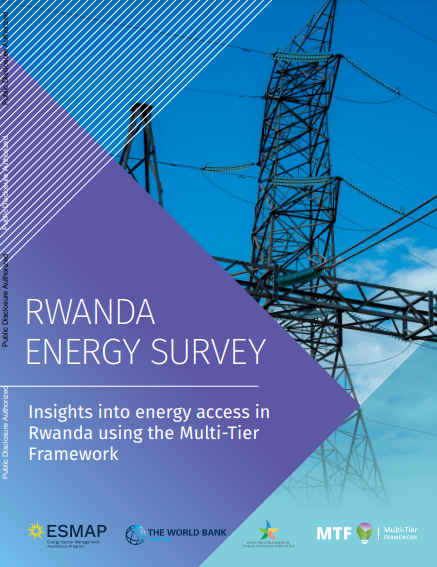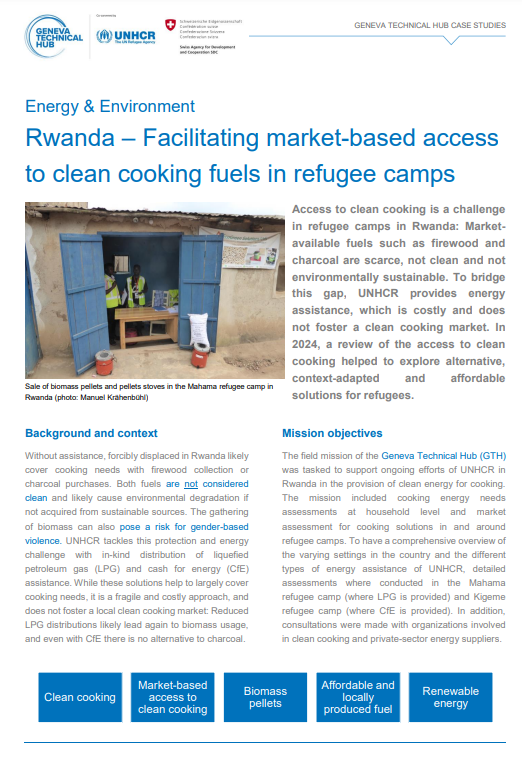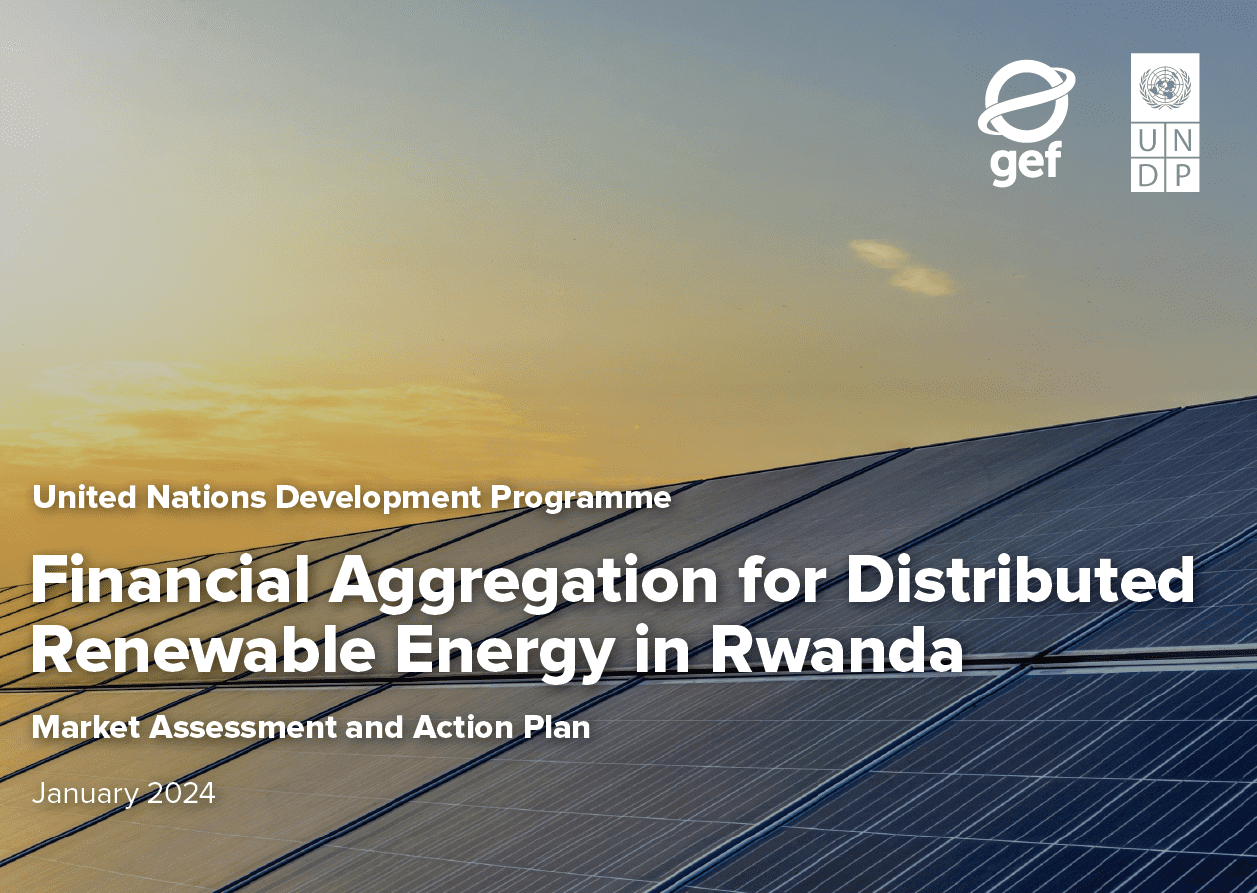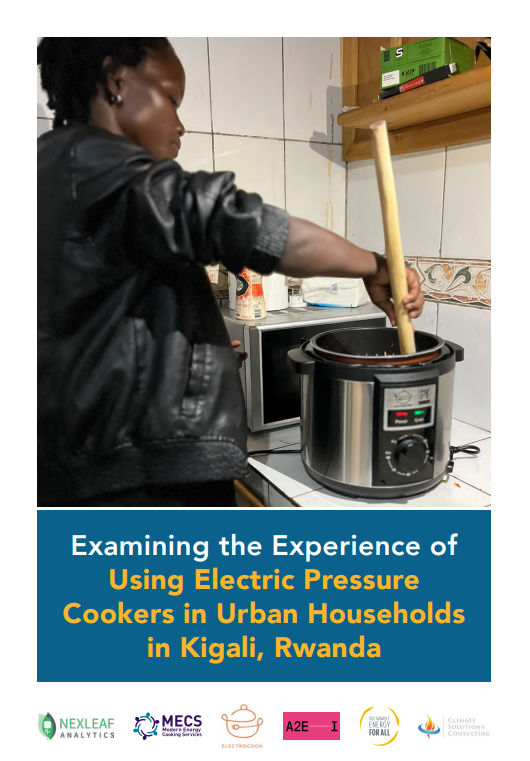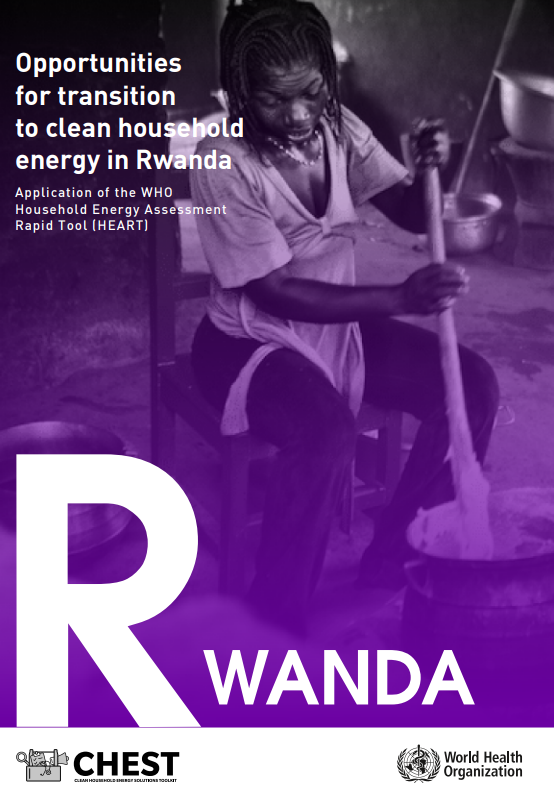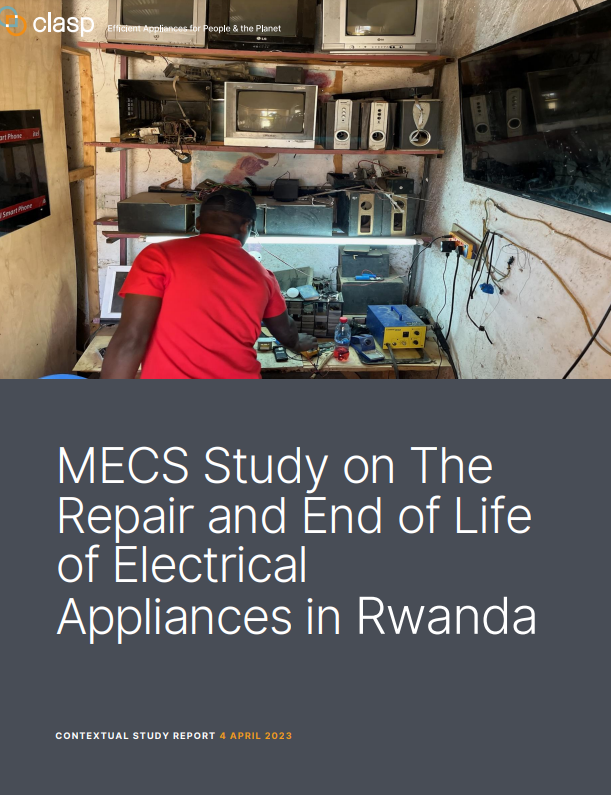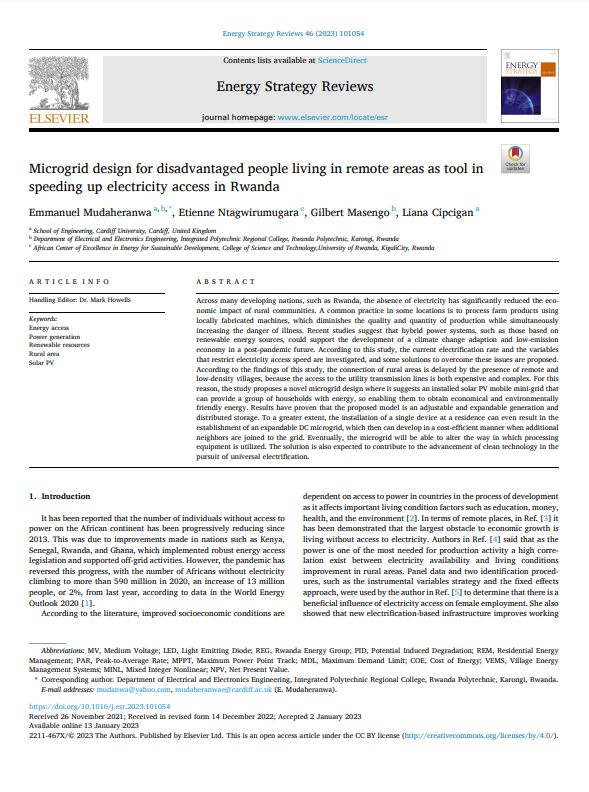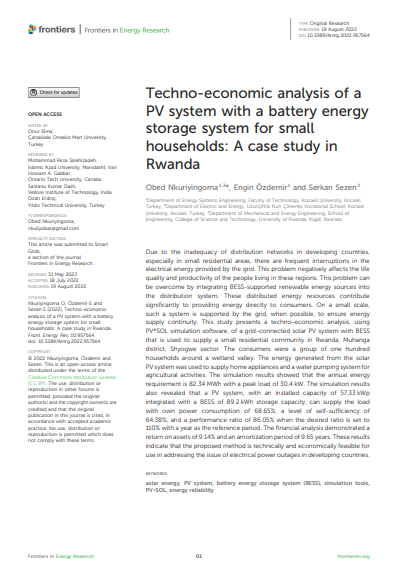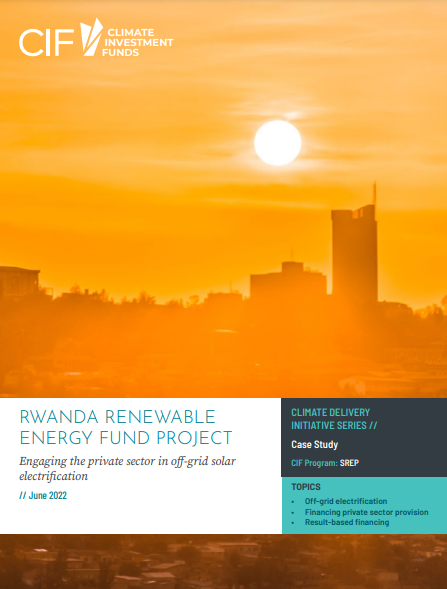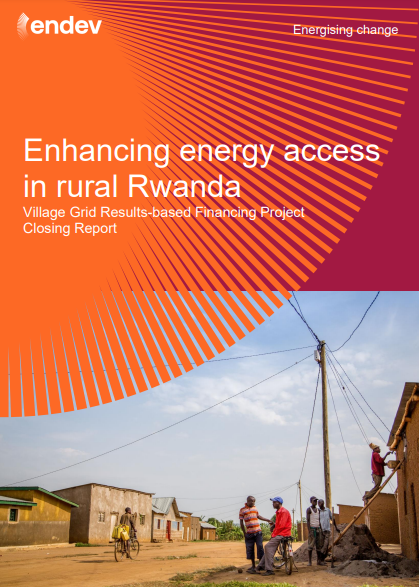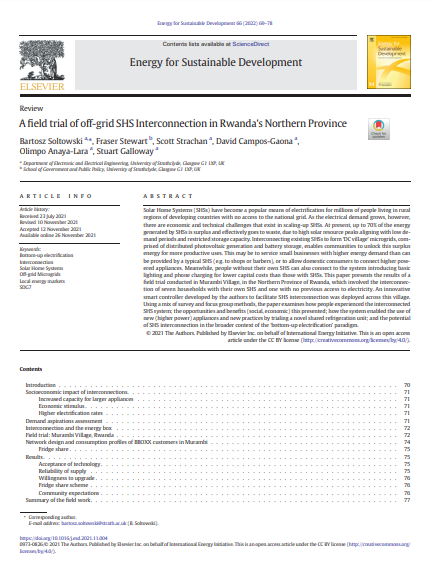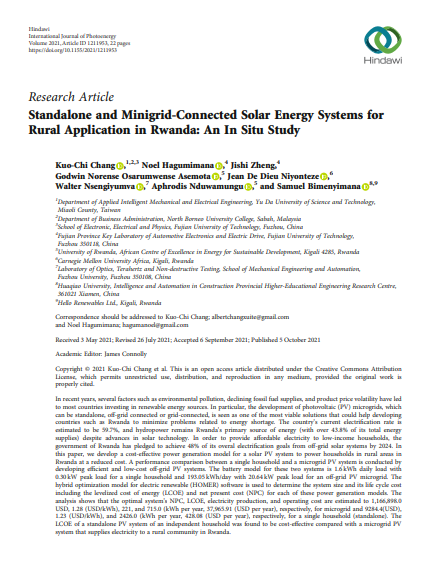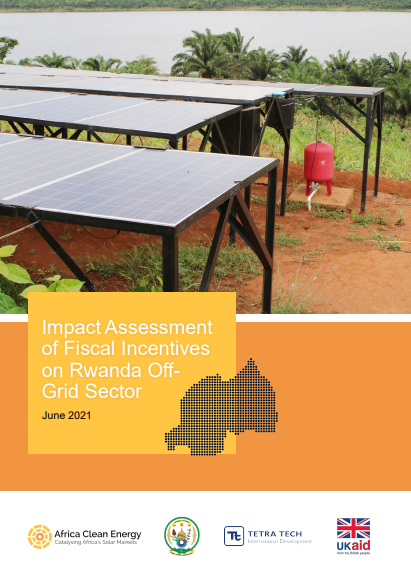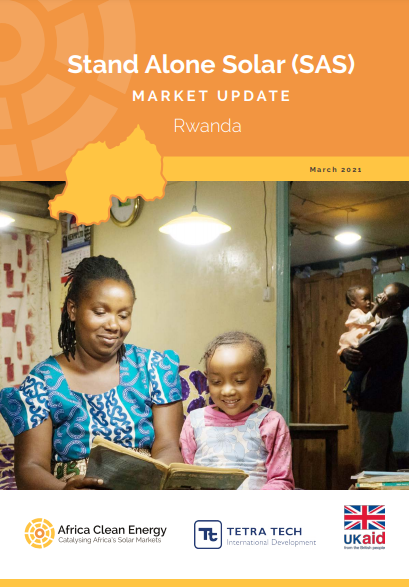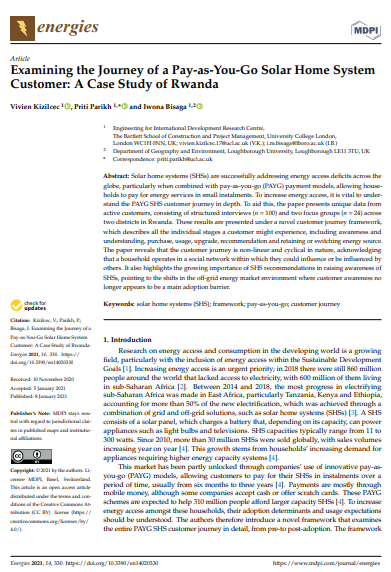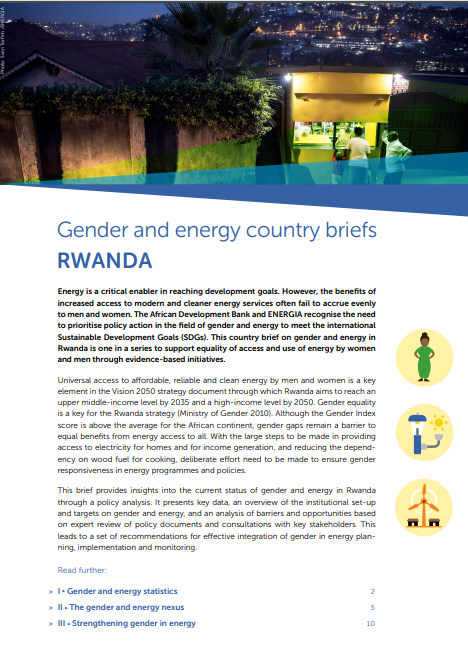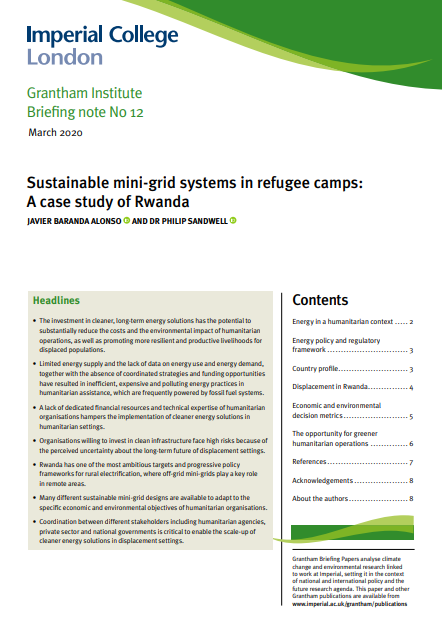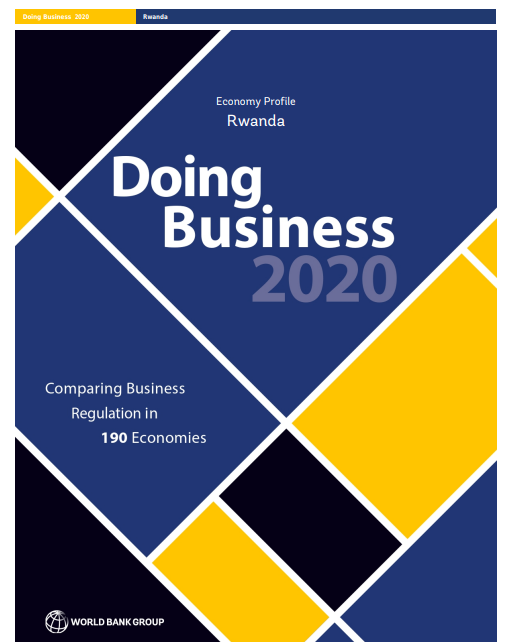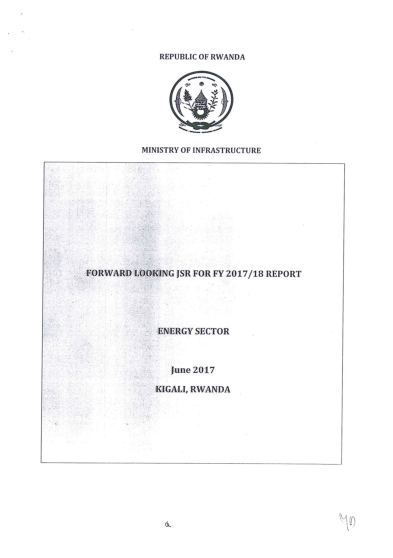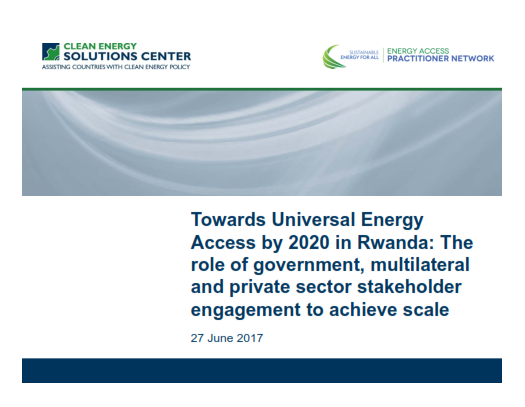We post here the relevant reports for the power sector in Rwanda. Feel free to join our efforts and share us any other you may have found. We'd be glad to add them to the list. Just send an email to This email address is being protected from spambots. You need JavaScript enabled to view it.
Publication date: 4 September 2024
Author: The World Bank
Description: This report presents the findings from a national energy survey conducted in Rwanda in June 2022, which followed up on an inaugural energy survey conducted in 2016. The survey captured the status of access to electricity and clean cooking among Rwandan households, including those of refugees, and also among public institutions. Survey results were analyzed using the multi-tier framework (MTF) for energy access, which measures energy access across six levels (Tier 0 to Tier 5) instead of evaluating it based on a binary definition, having access or not, and explores the multi-dimensional nature of energy access and the diverse technologies and sources that can provide it. Findings from this analysis based on full-spectrum data can inform energy policy designs in Rwanda, empower data-driven policy making, and aid in advancing toward Goal 7 of the 17 sustainable development goals of the United Nations: to ensure access to affordable, reliable, sustainable, and modern energy for all by 2030.
Download Report >>
Visit Website >>
Publication date: 25 March 2024
Author: Geneva Technical Hub (GTH)
Description: Without assistance, forcibly displaced in Rwanda likely cover cooking needs with firewood collection or charcoal purchases. Both fuels are not considered clean and likely cause environmental degradation if not acquired from sustainable sources. The gathering of biomass can also pose a risk for gender-based violence. UNHCR tackles this protection and energy challenge with in-kind distribution of liquefied petroleum gas (LPG) and cash for energy (CfE) assistance. While these solutions help to largely cover cooking needs, it is a fragile and costly approach, and does not foster a local clean cooking market: Reduced LPG distributions likely lead again to biomass usage, and even with CfE there is no alternative to charcoal.
Download Report >>
Visit Website >>
Publication date: 25 January 2024
Author: UNDP
Description: Focusing on Rwanda, this country report is part of a three-part series on Distributed Renewable Energy (DRE) in East Africa. It assesses the financial challenges faced by the energy access sector and proposes financial aggregation, specifically the aggregation of distributed renewable energy (DRE) receivables, as a possible avenue.
Download Report >>
Visit Website >>
Publication date: 6 November 2023
Author: SEforALL
Description: Up until recently, cooking with electricity was not viewed as a viable clean cooking alternative in Rwanda and other low-middle income countries (LMICs) due to the relatively high cost and inefficiency of electric cooking appliances, low levels of electricity access, and high cost of electricity where connections are available. However, with the emergence of energy-efficient appliances such as electric pressure cookers (EPCs) and the increasing availability and improved reliability of electricity, particularly in urban centres, electric cooking has become an option for greater numbers of people.
This report presents the findings of a study on the experience of urban households in Kigali using EPCs and the impact of those on stove(s) and fuel(s) usage, fuel stacking, cooking expenditure, time savings and cooking habits, including any changes in the types of dishes cooked. The results show that the overall experience of cooking with an EPC, which was a new cooking appliance to nearly all participating households, was positive.
Download Report >>
Visit Website >>
Publication date: 10 October 2023
Author: World Health Organization
Description: Almost the entire Rwandan population (98.5%) relies on polluting fuels, particularly firewood and charcoal, for cooking. Access to clean energy such as electricity is still limited. In 2022, 70% of the population lived in towns and villages that have electricity – 49% from the national grid and 21% from off-grid (mainly solar) systems. When access is defined as connection and use of households to electricity, an estimated 47% of households had access in 2020, representing 86% of the urban population but only 38% of the rural population.
Download Report >>
Visit Website >>
Publication date: 4 April 2023
Author: CLASP
Description: Appliances enhance living standards and have become indispensable to modern societies. Increased access to electricity, increased levels of disposable income, and growing urbanization are key contributors to the increasing number of appliances. Consequently, the amount of e-waste generated from these appliances is equally rising; leading to ever-growing urgency for their proper management and disposal given the potential health and environmental hazards they pose.
Download Report >>
Publication date: March 2023
Author: Elsevier
Description: Across many developing nations, such as Rwanda, the absence of electricity has significantly reduced the economic impact of rural communities. A common practice in some locations is to process farm products using locally fabricated machines, which diminishes the quality and quantity of production while simultaneously increasing the danger of illness. Recent studies suggest that hybrid power systems, such as those based on renewable energy sources, could support the development of a climate change adaption and low-emission economy in a post-pandemic future. According to this study, the current electrification rate and the variables that restrict electricity access speed are investigated, and some solutions to overcome these issues are proposed. According to the findings of this study, the connection of rural areas is delayed by the presence of remote and low-density villages, because the access to the utility transmission lines is both expensive and complex. For this reason, the study proposes a novel microgrid design where it suggests an installed solar PV mobile mini-grid that can provide a group of households with energy, so enabling them to obtain economical and environmentally friendly energy.
Download Report >>
Visit Website >>
Publication date: 19 August 2022
Author: Frontiers in Energy Research
Description: Due to the inadequacy of distribution networks in developing countries, especially in small residential areas, there are frequent interruptions in the electrical energy provided by the grid. This problem negatively affects the life quality and productivity of the people living in these regions. This problem can be overcome by integrating BESS-supported renewable energy sources into the distribution system. These distributed energy resources contribute significantly to providing energy directly to consumers.
Download Report >>
Visit Website >>
Publication date: June 2022
Author: CIF
Description: This case study examines the first four years of the planned six-year implementation of the Rwanda Renewable Energy Fund (REF) project — the country’s largest off-grid expansion program — with a focus on its delivery challenges and solutions.
The case study aims to provide lessons from the project on how teams have addressed delivery challenges in climate projects.
Download Report >>
Visit Website >>
Publication date: 8 February 2022
Author: EnDev
Description: The Rwanda Village Grid Results-based Financing (RBF) Project Closing report outlines the design, implementation, results and lessons learned of the 7-year program, which ran from 2013- 2020 with the aim of supporting privately developed mini-grids in Rwanda.
The project, which supported over 10,000 people reach access to electricity and supported four companies in constructing both solar and hydro mini-grids, overcame a number of challenges and gained valuable lessons learned in the design and implementation of a mini-grid RBF program. The report highlights both the achievements and struggles, while providing valuable lessons for future RBF programs.
Download Report >>
Visit Website >>
Publication date: 26 November 2021
Author: Elsevier
Description: Solar Home Systems (SHSs) have become a popular means of electrification for millions of people living in rural regions of developing countries with no access to the national grid. As the electrical demand grows, however, there are economic and technical challenges that exist in scaling-up SHSs. At present, up to 70% of the energy generated by SHSs is surplus and effectively goes to waste, due to high solar resource peaks aligning with low demand periods and restricted storage capacity.
Download Report >>
Visit Website >>
Publication date: 5 October 2021
Author: Hindawi
Description: In recent years, several factors such as environmental pollution, declining fossil fuel supplies, and product price volatility have led to most countries investing in renewable energy sources. In particular, the development of photovoltaic (PV) microgrids, which can be standalone, off-grid connected or grid-connected, is seen as one of the most viable solutions that could help developing countries such as Rwanda to minimize problems related to energy shortage. The country’s current electrification rate is estimated to be 59.7%, and hydropower remains Rwanda’s primary source of energy (with over 43.8% of its total energy supplies) despite advances in solar technology. In order to provide affordable electricity to low-income households, the government of Rwanda has pledged to achieve 48% of its overal electrification goals from off-grid solar systems by 2024.
Download Report >>
Visit Website >>
Publication date: June 2021
Author: ACE-TAF
Description: This study builds on the previously developed ACE TAF multi-country responsible taxation tool and extends it to better reflect the context and key policy questions in Rwanda. It extends the analysis to consider the impact of other fiscal incentives such as results-based finance grants, and minimum quality standards. It also looks in more detail at key issues to reach the remaining unconnected households in Rwanda, with a focus on affordability. In addition to building on the quantitative tool, a further 11 key stakeholders were engaged bilaterally to inform the analysis, and a small survey of over 100 households included to help calibrate modeling assumptions to the reality of current and potential off-grid energy end users.
Download Report >>
Visit Website >>
Publication date: March 2021
Author: Tetra Tech International Development
Description: Prior to the pandemic, Rwanda enjoyed impressive economic growth, exceeding 8 per cent Gross Domestic Product (GDP) growth in 2018 and 2019 that was driven by strong public investment. During the pandemic, Rwanda implemented well-coordinated preventive measures, including lockdowns, and has largely successfully controlled the spread of the virus. Nevertheless, serious economic challenges lie ahead, with significant slowdown of core economic sectors such as services and industry. The government has responded with an economic stimulus package and instructed commercial banks to ease loan repayment conditions.
Download Report >>
Publication date: 8 January 2021
Author: MDPI
Description: Solar home systems (SHSs) are successfully addressing energy access deficits across the globe, particularly when combined with pay-as-you-go (PAYG) payment models, allowing households to pay for energy services in small instalments. To increase energy access, it is vital to understand the PAYG SHS customer journey in depth. To aid this, the paper presents unique data from active customers, consisting of structured interviews (n = 100) and two focus groups (n = 24) across two districts in Rwanda.
Download Report >>
Visit Website >>
Publication date: 23 November 2020
Author: African Development Bank
Description: Energy is a critical enabler in reaching development goals. However, the benefits of increased access to modern and cleaner energy services often fail to accrue evenly to men and women. The African Development Bank and ENERGIA recognise the need to prioritise policy action in the field of gender and energy to meet the international Sustainable Development Goals (SDGs). This country brief on gender and energy in Rwanda is one in a series to support equality of access and use of energy by women and men through evidence-based initiatives.
Download Report >>
Publication date: March 2020
Author: Imperial College London
Description: Rwanda is an example of rapid scale-up of electrification and energy access. Access to electricity in Rwanda rose from 6% of households in 2008 to 49% in 2019.
Download Report >>
Visit Website >>
Publication date: 2020
Author: World Bank Group
Description: Economy Profile Rwanda
Download Report >>
Publication date: 2017, June
Author: MININFRA
Description: Access to safe, reliable and cost effective energy is essential to achieve the levels of growth defined under the Economic Development and Poverty Reduction Strategy (EDPRS II).
Download Report >>
Publication date: 2017, June
Author: Clean Energy Solutions
Description: The Clean Energy Solutions Center does not endorse or recommend specific products or services. Information provided in this webinar is featured in the Solutions Center’s resource library as one of many best practice resources reviewed and selected by technical experts.
Download Report >>
Visit Website >>





